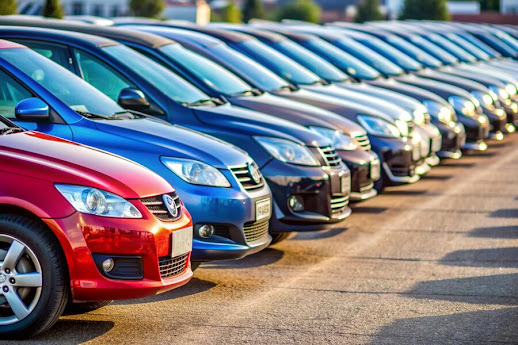Most people's first thoughts when looking for a new car are visiting a conventional dealership or perusing internet markets for a car in perfect shape. Still, smart investors are turning to another choice more and more: hail damaged vehicles for sale. Although hailstorms may have caused damage to these vehicles' exteriors, many times they provide great value for those ready to see past outward flaws.
For various reasons, buying vehicles damaged by hail might be a wise investment. This choice offers several advantages regardless of your interests—budget-conscious buyer, auto enthusiast searching for a project, or someone interested in profitably reselling. This essay will discuss why, particularly for those who often attend auto auctions such as the Nampa car auction, purchasing hail-damaged vehicles for sale is a decision worth considering.
1. Significant Cost Savings
One of the main benefits of buying vehicles damaged by hail is the significant cost reduction. After a hailstorm damages a car, its cosmetic damage usually results in lower market value. Still, this price drop does not always correspond with a loss in the vehicle's capability. Usually restricted to dents on the body panels or broken windows, most hail damage does not compromise the technical running of the car.
Purchasing a hail-damaged car for sale allows purchasers to often save anywhere from 30% to 50% compared to buying a comparable car in an undamaged state. Budget-conscious families or people may be able to buy a newer model or a car with more features from this price difference. The savings can also be used for the simple enjoyment of the reduced cost, repairs of damage, or updating other parts of the vehicle.
2. Minimal Mechanical Impact
The degree of the damage is one of the main issues possible purchasers of damaged cars for sale find troubling. Hailstorms usually inflict cosmetic damage, rather than mechanical difficulties, though. Although the outside might show some dents or scrapes, the engine, transmission, and other important car parts are usually unharmed.
A thorough assessment guarantees that there are no underlying problems in a hail-damaged car before you buy it. Should the car pass a structural soundness and mechanical assessment, it can offer the same dependability as a non-damaged car. Basically, for a fraction of the price, purchasers experience the same performance.
3. Ideal for Resale or Flipping
Hail-damaged autos for sale offer a great chance for profit for those in the car resale or flipping company. People with the correct knowledge may fix the cosmetic flaws in these vehicles, so enabling them to sell the car at a higher price range.
Depending on the degree of damage, bodywork repairs—especially for hail damage—can be rather reasonably expensive. For consumers who know how to get reasonably priced labour and components, the repair procedure can be a quick and successful endeavour. Particularly if the car runs well, many purchasers are ready to overlook little visual defects in exchange for a lower price even if the automobile is not brought back to flawless condition.
Attending auctions like the Nampa car auction, you may often find a large range of hail-damaged vehicles waiting for purchase. For seasoned buyers, these auctions present a great chance to buy several automobiles, fix them, and resell them for profit.
4. Insurance Claims and Opportunities
Buying damaged cars for sale also has the benefit of maybe saving more using insurance claims. Sometimes customers could be able to buy the car, submit a claim with their insurance provider, and get paid for damage, helping to offset the repair expenses.
Review your insurance policy to find out whether hail damage is covered before deciding on a hail-damaged car. While some plans could cover pre-existing hail damage, others could mandate that the damage happened following the purchase. Knowing your coverage will enable you to maximize the financial advantage of purchasing a vehicle damaged by a storm.
Buyers should also make sure the lender covers the repair expenses if the car is financed or think about getting gap insurance to guard their investment. This kind of insurance guarantees that you won't be caught having to pay off a loan on a car that loses value should the vehicle be further damaged or totalled.
5. Availability at Auto Auctions
Auto auctions provide a large range of cars to pick from and many damaged autos for sale are discovered there. Many times, these auctions including the Nampa car auction feature vehicles written off by insurance companies from hail damage. These vehicles are sometimes sold for a fraction of their original worth since insurance companies are keen to recover part of their losses.
Attending an automobile auction lets participants bid on cars that may be far below their market value. Particularly the Nampa car auction is well-known for providing a large selection of vehicles, including ones with hail damage, so it's a great area for purchasers to locate a bargain. Many times, auction attendees can check the vehicles before bidding to be sure they understand the degree of damage and can decide whether the automobile would be a wise purchase.
6. Easy to Repair Cosmetic Damage
The most often occurring problem with hail-damaged cars for sale is the visual dents and dings hailstones produce. Fortunately, numerous techniques of repair are accessible to treat this kind of damage. Among the most often used and reasonably priced fixes for hail-damaged cars is paintless dent repair (PDR).
PDR is dent removal without vehicle painting needed. Skilled experts ensure the vehicle looks new by pushing the metal back into its original form using specialist equipment, therefore keeping the factory polished. PDR can make a hail-damaged vehicle look almost exactly like an undamaged one for purchasers ready to pay for cosmetic fixes.
The cost is generally less than the savings obtained by buying a hail-damaged car, even if the vehicle needs more thorough repairs, including panel replacement or repainting. This can be a reasonable and worthy investment for handy purchasers or those with ties to reasonably priced repair facilities.
7. Variety of Models Available
You will probably find a great range of makes and models while looking for sold hail-damaged autos. Hailstorms are non-discinct, hence everything from luxury autos to cheap vehicles can be affected. Buyers thus have a wide range of options from which to choose the ideal car at a lowered price.
Whether your tastes run to a family SUV, a dependable commuter car, or even a high-end luxury car, hail-damaged vehicles present a variety of choices. A great place to start for consumers trying to find a bargain on a car that might otherwise be outside their budget is auctions like the Nampa car auction.
8. Environmentally Friendly Choice
Another ecologically beneficial choice is buying broken cars for sale. Vehicles written off for cosmetic damage could wind up in junkyards or scrap piles, therefore adding to waste. Buyers of hail-damaged cars are giving them a second life and helping to cut waste by purchasing and fixing them.
Repairing a hail-damaged car also uses fewer resources than building a new car, which reduces raw material and energy usage and environmental impact. Investing in a hail-damaged car allows environmentally aware consumers to reduce their environmental impact and obtain a dependable car.
Conclusion
From major cost savings to possible resale earnings, buying damaged vehicles for sale can be a wise investment for many different reasons. These vehicles offer a reasonably priced and generally mechanically sound substitute for conventional automobile buying for budget-conscious consumers searching for a project, those interested in profit-driven flipping of cars, or others. There has never been a better time to think about buying a hail-damaged car given the prospects at the Nampa car auction and other auto auctions. Understanding your insurance choices, planning for repairs, and carefully evaluating the degree of damage will help you transform a hail-damaged car into a wise and reasonably priced investment.






.jpg)

